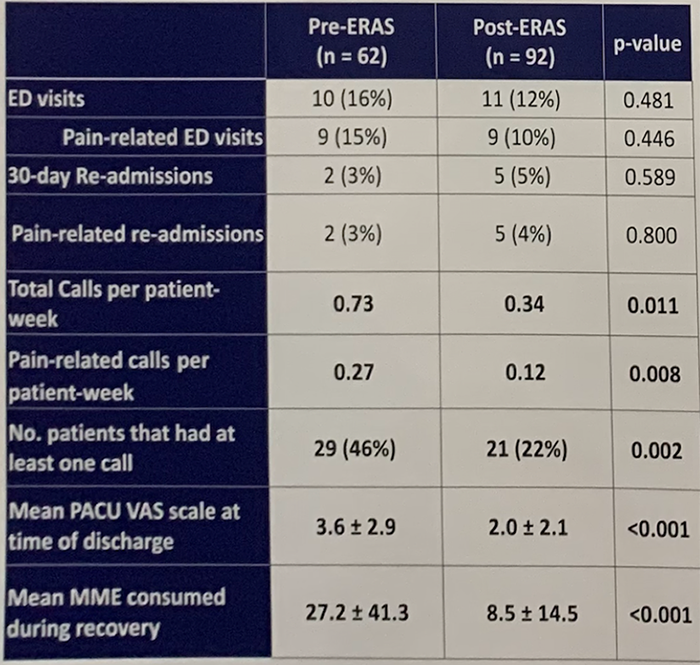Abu Dhabi, United Arab Emirates (UroToday.com) Pain-control in urologic procedures is a hot topic and is of utmost importance. Protocols called Enhanced Recover After Surgery (ERAS) protocols are being developed to make this process smoother and to prevent excessive use of narcotic medications. This study, presented by Dr. Johnson, addresses the unusually large number of unexpected patient-initiated encounters in the peri-operative period. Patients reach out to their providers more to discuss their pain in urologic procedures. The thought was that an ERAS protocol would reduce the need for the patient to contact their provider to discuss pain.
They included patients for stones that went through their ERAS protocol after ureteroscopy. Data was collected from October 2017 – January 2018; this was determined to be a 3 month “wash-in” period. 100 consecutive patients were scheduled for ureteroscopy between May 2018 and August 2018, and compared to a control group of patients before the ERAS protocol was implemented. They looked at the post-anesthesia care unit visual analog pain scale scores and morphine milligram equivalent usages in these patients. To address their main question, all 7-day postoperative clinic or on-call telephone encounters or calls were recorded. ED visits within 30 days and hospital re-admissions were recorded.

It was found that the total number of calls and pain-related calls were twice as frequent in the pre-ERAS group compared to the post-ERAS group. Furthermore, twice as many patients made at least 1 call in the pre-ERAS group compared to the post-ERAS group. Therefore, it is clear that the ERAS protocol decreased the frequency at which patients were calling to discuss pain after their procedure. Patients in the ERAS protocol also had less pain and required less narcotic medications while in the PACU.
This protocol led to patients not needing to call as frequently after their procedure. This may be because in the ERAS protocol, they have a better understanding of their pain and their pain may be better controlled. The thought is that the ERAS protocol enhanced the peri-operative patient experience.
Presented by: Brett Johnson, MD, Assitant Professor, Department of Urology, University of Texas Southwestern Medical Center, Dallas, Texas
Written by: Rajiv Karani, Department of Urology, University of California, Irvine at the 37th World Congress of Endourology (WCE) – October 29th-November 2nd, Abu Dhabi, United Arab Emirates
